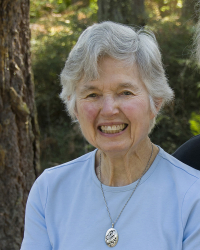You are here
Lynn M.-Riddiford

My research over the years on molting and metamorphosis in the tobacco hornworm, Manduca sexta, has been instrumental in the establishment of this organism as a model for the endocrine regulation of post-embryonic development of insects. One major theme has been to understand how juvenile hormone prevents the metamorphosis of a caterpillar to a moth and also how it regulates embryogenesis. Most of our effort has been on the basic side delving down from the organism to the molecular level. We also have contributed to the application of juvenile hormone as an Insect Growth Regulator (IGR) which is in current use in mosquito and flea control and some integrated pest management schemes for agricultural lepidopteran pests. Hormones and behavior in Lepidoptera as well as sex pheromone reception were other early themes in my research. At Janelia, I studied the hormonal regulation of neurodevelopment and behavior in Drosophila.
Presently, at FHL I am continuing studies on the role of juvenile hormone in metamorphosis of the Drosophila nervous system and extending my research to the regulation of metamorphosis in Crustacea. Also, Jim Truman and I are continuing our collaboration on the evolution of metamorphosis. We are particularly interested in how the hormonal control of embryonic development in the ancestral insects may have driven the evolution of complete metamorphosis. Currently, we are studying the effects of JH on embryonic and early nymphal development of silverfish.
Growing up on a dairy farm in Illinois sparked my interest in biology which led to two exciting summers of research in the high school summer program at the Roscoe B. Jackson Laboratory at Bar Harbor, Maine. At Radcliffe College I majored in Biochemical Sciences, and my senior research thesis in the laboratory of Professor Carroll Williams involved the search for the insect juvenile hormone in various vertebrate tissues. For my Ph. D. at Cornell University, I studied the role of epidermal dedifferentiation in newt limb regeneration with Professor Marcus Singer in Zoology and the physical chemical properties of the clam muscle protein paramyosin with Professor Harold Scheraga in Chemistry (my dissertation). My first postdoctoral research was in protein physical chemistry at Harvard University, then I taught introductory biology and animal physiology at Wellesley College (a woman’s college) for two years. decided to forsake protein chemistry and to return to insect endocrinology, spending a year as a Research Fellow back at Harvard University in Professor Carroll Williams’s laboratory learning more about juvenile hormone. In 1966 I became the first woman Assistant Professor (followed by Associate Professor in 1971) in the Department of Biology at Harvard University, where I, my students and postdocs began exploring many aspects of the endocrine control of insect development and reproductive behavior. I moved with my husband James Truman to the Department of Zoology, University of Washington in 1973 as a tenured Associate Professor and became Professor of Zoology in 1975 and the first Virginia and Prentice Bloedel University Professor from 2000-2005. I became Professor of Biology in 2003 when the Departments of Zoology and Botany merged and retired as Professor of Biology Emerita in September, 2007. We then moved to the Janelia Research Campus of the Howard Hughes Medical Institute in Ashburn, VA for 9 years where I was a Senior Fellow studying the hormonal regulation of neurodevelopment and behavior in Drosophila. In 2016 we returned to set up our lab at the Friday Harbor Laboratories.
I am a member of the National Academy of Sciences, a Fellow of the American Academy of Arts and Sciences, AAAS, and the Entomological Society of America, and an Honorary Fellow of the Royal Entomological Society (England). Also, I received the first Recognition Award in Insect Physiology, Biochemistry, and Toxicology from the Entomological Society of America in 1997, the G. J. Mendel Honorary Medal for Merit in the Biological Sciences from the Academy of Sciences of the Czech Republic in 1998, and the Vollum Award for Distinguished Accomplishment in Science and Technology from Reed College in 2011. Fellowships from the John S. Guggenheim Foundation and Churchill College, University of Cambridge have supported two sabbaticals. I served from 1985-91 as a member of the Governing Board of the International Center for Insect Physiology and Ecology in Nairobi, Kenya, an institute devoted to research on African insect problems and education of African insect scientists. Also, I was President of the American Society of Zoologists in 1991-92 and of the Councils of the International Congress of Entomology (2000-2004) and of the Federation of International Comparative Endocrinological Societies (2001-2005). In addition, I have served on review and advisory panels for the National Science Foundation, the National Institutes of Health and the U. S. Department of Agriculture, the Scientific Advisory Board of the Whitney Marine Laboratory and the Board of Directors of the Entomological Foundation.
